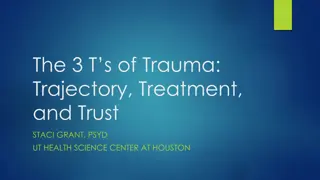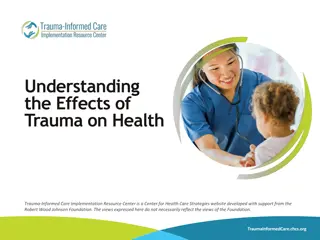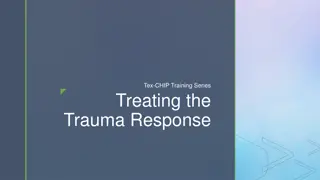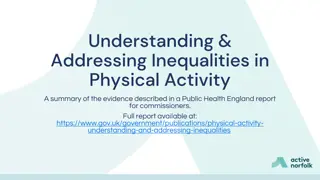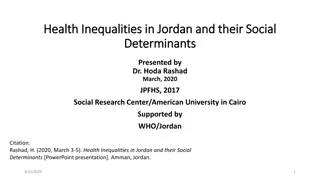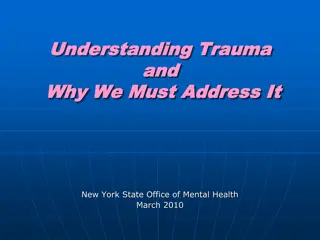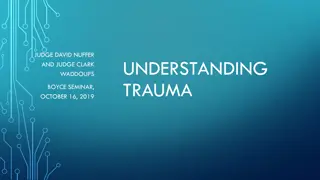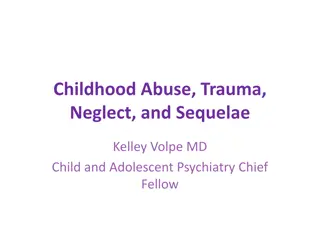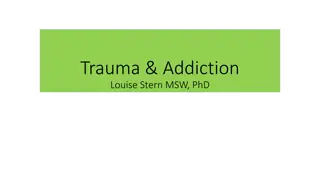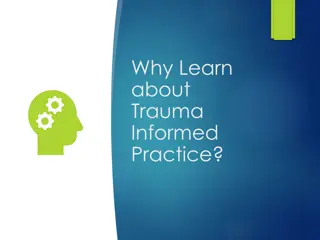Exploring Racial Trauma and Social Inequalities in Mental Health Settings
This comprehensive presentation delves into the intersectionality of racial trauma in mental health, emphasizing the impact of social inequalities on marginalized communities. It highlights disparities in care, prevalence of mental health issues among racial groups, and the role of racism in exacerbating mental health outcomes. Through a critical lens, it sheds light on the importance of addressing racial trauma within the broader context of societal disparities to promote equitable mental health support.
Download Presentation

Please find below an Image/Link to download the presentation.
The content on the website is provided AS IS for your information and personal use only. It may not be sold, licensed, or shared on other websites without obtaining consent from the author. Download presentation by click this link. If you encounter any issues during the download, it is possible that the publisher has removed the file from their server.
E N D
Presentation Transcript
Beyond the Individual: How PTMF foregrounds racial trauma Dr Anjula Gupta Consultant Clinical Psychologist/ Clinical Tutor 24thMay 2022 1
Outline Racial trauma/abuses PTMF with a racial abuses focus Composite case study Context 2
Context Focus on race and living with racism but intersectionality is relevant especially class invite to stay with race as a unique experience, not to be compared. Language racialised groups, black and brown people, or global majority Race Report, 2021, BLM activity and response to this, Xmas advertising Invite to look through a racialised lens rather than the dominant white supremacy lens e.g. race protests of 1980 s vs race riots Prejudice + Power = Racism 3
Setting the scene: Social inequalities Social inequality is the extent to which there are differences between groups in society. Inequality costs the UK more than 39 billion through its impact on health, wellbeing and crime. (Source: Equality Trust) Despite educational attainments racialised groups still face significant barriers in social mobility and job opportunities Centre on Dynamics of Ethnicity, 2014. Other research has shown that many health and social outcomes also tend to be optimal when societies are more equal. (Kirkbride, 2012) 4
Setting the scene Experience in mental health settings Higher rates of suicide among South Asian women (Burr, 2002) and self - harm rates for Black and Asian women (Cooper et al, 2010, 2013) Pathway to care for African-Caribbean families through police and legal system (Morgan et al, 2005) Black men 5 times more likely to be diagnosed with Schizophrenia (Metzi, 2010) and 6 times more likely to be detained (CQC, 2010) Racialised people less likely to be offered psychological therapy (Fernando, 2003) 5
Setting the scene Experience in mental health settings Racialised communities living in areas with predominantly white communities have higher risk of developing psychosis (Boydell et al, 2013) Second generation migrants higher risk (Cantor-Graae & Selten, 2005) Excess risk of psychosis and poorer outcomes partially explained by racism, Sharpley et al (2001) . Narrative is marginalised or obscured by traditional models 6
PTMF with racial abuses focus Clinical experience shaming, uncomfortable, pain Vikki Reynolds the pain is necessary as signals injustice TIA doesn t include a critical race lens Maintenance of unjust status quo and inequalities social justice/relational ethics PTMF offers compassionate structure to identify and understand the effects of living with racism 7
PTMF with racial abuses focus Makes social inequalities visible, allowing anti racist practice Restores the link between distress and social injustice connecting with personal and intergenerational trauma Opportunity to create validating and empowering narratives Promotes social action 8
Composite Case study Example Men and women of black and Asian heritage Presenting with unusual experiences 9
What has happened to you? (How is Power operating in your life?) Structural/institutional power white supremacy Interpersonal racial abuse, bullying, violence, micro aggressions, implicit and explicit Interactions with authorities police, criminal justice system, mental health services, education system Socio economic adversity Ideological power over narratives on colonial/slavery history intergenerational trauma Biological/embodied power attractiveness, sexualization of black and brown bodies, aggression 10
How did it affect you? (What kinds of Threat does this pose?) Threat to life Threat of bodily harm self, family, community Threat of rejection Psychological Emotional powerlessness, lack of control Social status/social position/ranking Value based internalized racism, colourism Meaning making imposition of meaning and language 11
What sense did you make of it? (What is the Meaning of these experiences to you?) Dangerous Vulnerable/afraid Powerless Helpless Emotionally overwhelmed Humiliated/shamed Alienated don t belong Defeated/Inferior not good enough Lonely 12
What did you have to do to survive? (What kinds of Threat Response are you using?) Suspiciousness Hypervigilance Anger/aggression Carrying weapons Mistrustful or difficult relationships with authority Alcohol/substances Promiscuity/sex working Confrontational Voice hearing Unusual beliefs police, government Depression/emotional withdrawal Elation 13
Strengths and Power Resources Family Community Religion Services 14
Implications Responses to racism and white supremacy become visible and meaningful Creates empowering and validating narratives that encompasses the full experience of racialised communities provides language Promotes social action and change Allows us to be accountable (psychology) and enact relational ethics Opportunity to prevent the perpetuation of racial abuses/trauma and re traumatise TIA To be anti racist vs not being racist 15
Implications To create safe spaces for shaming experiences requires an understanding of own race and meanings/experience Not everyone ready to talk about what has been done/experienced Continue to ask the questions Note to be cautious about pathologising racial trauma as mental health problem rather than natural response to prejudice and power. 16
Summary A framework that understands people in their relational, social, cultural and political environments PTMF offers a structure to have conversations about social position/social power and the impact of this, in terms of race. It restores the links between threats and threat responses It enacts social justice by restoring links and meaning It makes visible the invisible social forces that adversely affect people to service users, staff, services and commissioners Provides a richer narrative about the impact of racism other than as individual illness or as symptoms 17








